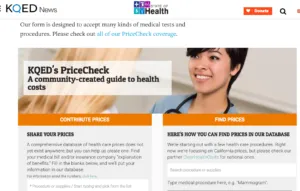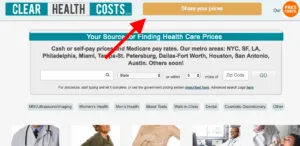Clear Health Costs
We tell people what stuff costs in health care. Help make us more mobile-friendly!

Project Description
We tell people what stuff costs in health care.
Did you know that a simple procedure like an MRI can cost $300 – or $6,000? And you could pay thousands, or just a little, depending on your health insurance, and whether you're insured or not.
We’re like Kayak.com + Waze.com for health care prices.
We were recently described as one of the "benevolent geniuses" working to fix health care. We report on and crowdsource health prices, on our home site at ClearHealthCosts.com and with our media partners (here's one example, at WLRN public radio in Miami, and here's another, at KQED in San Francisco). We use the prices to inform our communities about health costs, and to make great news stories about this issue -- like this one and this one. It's perhaps the biggest issue we face as a nation. Rising health costs threaten our health, and the health of our families. Costs stress our economy, and overburden spending by governments. We don’t have every price for everything -- but we’re working on ways to help you unlock the mysteries of health prices.
What we are raising money for here and now: We are making our home website easier to use on smartphones and tablets, like iPads.
Why?
Among our most-read posts are those on the cost of birth-control pills, an STD test, an IUD and an abortion – on Saturday and Sunday mornings, on mobile (smartphones and tablets, like iPads). We know you're reading us on mobile devices, and we need to improve your experience when you come to us using mobile.
Thank you so much for your support!
Update Dec. 11, 2016: We met our goal! Now, we're adding a stretch goal.
We reached our goal of $15,000. Thank you so much!
We have decided to add a stretch goal of $20,000 for the remainder of the campaign and are confident that we can do it.
With that, we’ll be able to create a small “widget” — software that we can embed on others’ sites to show prices. This lets us follow the web wisdom: Don’t always ask them to come to you — you need to go where they are. We thought about other stretch goals, and chose this because it lets us reach more people faster. (We already have a two-way widget, which our news partners use to both collect and display prices; this will let us build/perfect our draft one-way widget, that displays prices only — no collecting.)
We're up until Dec. 23. We would be grateful for your support!
What is your mission?

We tell people what procedures and prescriptions cost in health care. We’re like Kayak.com + Waze.com for health care prices – with journalism DNA.
We were recently described as one of the "benevolent geniuses" working to fix health care.
We are collecting and crowdsourcing health prices in partnership with big news media organizations and others. We use the prices to inform our communities about health costs.
The results: You have a better idea of costs, although it's still a market plagued by hidden knowledge, "we can't tell you that" and gotcha bills. We can't fix all of that! Other results from our work: meaningful journalism; good data; deep community engagement; wide earned media; better access to care in underserved communities; better awareness of health cost disparities.
Our home site is clearhealthcosts.com. We collect data via provider surveys and data research. Then we put our interactive widget on news partners' web sites, pre-populating with our data, and asking community members to tell us what they were charged and what they paid.
Using that data, we make great journalism -- and the widget stays on partners' sites, collecting and dispensing data, 24-7.
Our CEO, Jeanne Pinder, is a former New York Times reporter, editor and human resources exec.
Our partnership with WLRN public radio in Miami, WUSF public radio in Tampa-St. Petersburg, and their joint project, Health News Florida, is drawing visitors from across the state and across the nation.
Our partnership with KQED public radio in San Francisco and KPCC/Southern California Public Radio in Los Angeles was funded by the John S. and James L. Knight Foundation. We also launched with WHYY public radio in Philadelphia, with funding from the Robert Wood Johnson Foundation. We're also partnering with MedPage Today, a giant provider of news, opinion and free continuing medical education to 670,000 providers.
Our pilot crowdsourcing partnership, with the Brian Lehrer show at WNYC public radio in New York City, took place in 2013. In about three weeks, 400 women came to tell us what they were charged and what they paid for their mammograms.
Here's a Harvard Business Review piece about our work with our media partners. We've been featured in The New York Times, The Wall Street Journal, on NPR and in USA Today. Our partner Lisa Aliferis from KQED wrote about our work in JAMA Internal Medicine, and it was accompanied by a positive editor's note, among other great earned media. (Look at our press page for some citations.)

You want to be better for mobile users. What does that mean?
When people read us on mobile devices smartphones and tablets, the experience isn't as great as it is on a laptop or a desktop screen. In the last 4 years, since we designed this site, our mobile traffic has risen to 60-plus percent, from 40 percent. It’s time for us to do what other publishers have done – redesign the site to be mobile first.
What are the risks of your project?
With any software development project, unexpected things happen. But we’ve had the same tech lead for three years, and we work well together.
I have some prices that I'd like to add to your database. How do I do that?
Go to our home site, ClearHealthCosts.com, and click on the "share your prices" button at the top of the front page. Here's a screenshot.

Who cares about your problem?
Anyone who uses health care needs to know costs. Deductibles and out-of-pocket charges are rising. People can't understand their bills. They get "gotcha" bills that may endanger their ability to pay their mortgage, to put food on the table. They may think they can't afford to get care, so they put it off -- and small problems become big problems.
Why do women care about this so much?
Women make 80-90 percent of health care decisions in the U.S. Women own reproductive health. Women own pediatricians' appointments. Women own elder care. Women run businesses. Women nag their spouses and significant others "Honey, did you get your cholesterol checked?"
Women run more single-parent families, and they get paid less, so punishing health care bills can be a disaster. Even a kid's sore throat can mean a bounced check, or an outrageous prescription bill.
When we talk to women about what we're doing, they say "I have been looking for this information for years" or "Are you live? Can I send this to my mom?" or "I’m so glad you’re doing this -- let me tell you what happened to me the other day with a bill!"
When we talk to men about this, they say "That’s interesting -- I haven't been to a doctor in 12 years" or "My wife handles that" or "Doesn't everything cost a $20 copay?"
Don't get us wrong: We love men. They just tend not to have as much experience and knowledge of this topic as women do.

How do we know we're effective?
You should see some of the compliments we get from our community:
--'Thank thank thank you. This is brilliant and useful. … projects like this can really help."
--"Your web site is amazing."
--“Please don’t stop what you’re doing.”
--"Thank you for covering this."
--"We saved $1,205."
--“I am outraged by this bill.”
--“I’m passionate about this issue. Please tell me how I can help.”
Isn’t it only uninsured people who care about prices?
With rising deductibles, rising co-insurance and rising out-of-network charges, insured people can also face enormous bills. It’s not uncommon to hear that people paying cash pay less than insured people, depending on the language in your insurance plan.
We advise people to always ask “How much will that cost? How much will that cost me? What if I paid cash?” Take notes. Take names. Take numbers. And tell us about it if you think it would help others.
Here’s a blog post about paying cash. Here's a Wall Street Journal article about that.
Can you tell us about some of the news stories you’ve written or contributed to?
We write a lot on the blog about various topics. You can go to our blog page and search – try search terms like colonoscopy, sleep study, STD test, MRI, prescriptions.
Here's a sampling, from our work and our partners' work.
How much do birth control pills cost?
How much does a colonoscopy cost? $600 or $5,400?
If restaurants billed like hospitals …
Why can't insurance companies' pricing databases tell the truth?
What about those out-of-network bills? How can I protect myself?
How much does it cost to have a baby in Northern California?
Save yourself a bundle: Pay cash for health care, even if you're insured
How to find out what things cost in advance.
How much does an abortion cost?
What other impact has your work had?
We also have been asked to testify to the California State Senate Health Committee on transparency and we were cited in a Stanford Health-Anthem Blue Cross contract dispute.
We were also asked to supply information to Covered California and the Center for Medicare and Medicaid Services.
Awards, honors: Our partners in California won an SPJ award for innovation in journalism. They also presented at the NICAR-IRE and Association of Health Care Journalists conferences.
Our partners in Philadelphia recently won the Public Service award at the Pennsylvania Associated Press Broadcasters Association for PriceCheck work.
We won two shark tank awards -- the Audience Choice award in the Consumer Shark Tank at the HHS Datapalooza in DC, and the New York Ehealth Cooperative Patient Shark Tank.
We have also been featured speakers at events including Politico Pro, the Department of Health and Human Services Datapalooza in Washington, the American Hospital Association, the Integrated Healthcare Association and Grantmakers in Health (for our demonstrated impact) and at other venues.
What momentum can you show?
We started in 2011 with $20,000 in winnings from a Shark Tank-type pitch contest.
When we started doing this, people told us that it was too hard, that it couldn't be done, that it was irrelevant, that powerful forces would put us out of business because "business as usual" is a tremendous force in health care, as in other industries.
But we persevered, and now we're a leading expert on health costs. We've brought sunlight to this incredibly important topic.
Why don't you have prices for every procedure or item, at every provider? And why don't you tell me what I would pay with my insurance plan, and my deductible?
That price list you want doesn't exist. That's what we're working to create.
Also, about your insurance plan and your deductible: Your insurance company should tell you that. Most insurers say they will tell you, but their their information is often partial or just plain wrong. Also, the insurance companies do not want to give us their information. They regard that as proprietary information -- if they pay Provider A $400 and Provider B $1,200 for the same procedure in the same city, it's not in their interest to reveal that.
You have mostly smaller-ticket items. I want big-ticket prices, for surgery and such.
Glad you asked: you can search our database from the search box on the front page to find data on our 30-35 common, shoppable procedures, in the 12 metro areas where we focus our efforts.
We have a separate database collecting bigger-ticket items, which you can find at this link. We require you to register to search. We're building this database, and it's getting bigger every day. The methodology of collecting data is different for the two data sets, so we keep them separate.
You can also use the search box on our front page, and the search on our partners' sites, to find what the government pays in your locale for a procedure via Medicare, the federal program for older people. That's the closest thing to a fixed or benchmark price in the marketplace.


I'm interested in partnering with you. Or I have a question you didn't answer here. How do I reach you?
Write to our CEO, Jeanne Pinder, at [email protected].
Updates
The Campaign FAQs
What is your mission?
We tell people what procedures and prescriptions cost in health care. We’re like Kayak.com + Waze.com for health care prices – with journalism DNA.
We were recently described as one of the "benevolent geniuses" working to fix health care.
We are collecting and crowdsourcing health prices in partnership with big news media organizations and others. We use the prices to inform our communities about health costs.
The results: You have a better idea of costs, although it's still a market plagued by hidden knowledge, "we can't tell you that" and gotcha bills. We can't fix all of that! Other results from our work: meaningful journalism; good data; deep community engagement; wide earned media; better access to care in underserved communities; better awareness of health cost disparities.
Our home site is clearhealthcosts.com. We collect data via provider surveys and data research. Then we put our interactive widget on news partners' web sites, pre-populating with our data, and asking community members to tell us what they were charged and what they paid.
Using that data, we make great journalism -- and the widget stays on partners' sites, collecting and dispensing data, 24-7.
Our CEO, Jeanne Pinder, is a former New York Times reporter, editor and human resources exec.
Our partnership with WLRN public radio in Miami, WUSF public radio in Tampa-St. Petersburg, and their joint project, Health News Florida, is drawing visitors from across the state and across the nation.
Our partnership with KQED public radio in San Francisco and KPCC/Southern California Public Radio in Los Angeles was funded by the John S. and James L. Knight Foundation. We also launched with WHYY public radio in Philadelphia, with funding from the Robert Wood Johnson Foundation. We're also partnering with MedPage Today, a giant provider of news, opinion and free continuing medical education to 670,000 providers.
Our pilot crowdsourcing partnership, with the Brian Lehrer show at WNYC public radio in New York City, took place in 2013. In about three weeks, 400 women came to tell us what they were charged and what they paid for their mammograms.
Here's a Harvard Business Review piece about our work with our media partners. We've been featured in The New York Times, The Wall Street Journal, on NPR and in USA Today. Our partner Lisa Aliferis from KQED wrote about our work in JAMA Internal Medicine, and it was accompanied by a positive editor's note, among other great earned media. (Look at our press page for some citations.)
You want to be better for mobile users. What does that mean?
When people read us on mobile devices smartphones and tablets, the experience isn't as great as it is on a laptop or a desktop screen. In the last 4 years, since we designed this site, our mobile traffic has risen to 60-plus percent, from 40 percent. It’s time for us to do what other publishers have done – redesign the site to be mobile first.
What are the risks of your project?
With any software development project, unexpected things happen. But we’ve had the same tech lead for three years, and we work well together.
I have some prices that I'd like to add to your database. How do I do that?
Go to our home site, ClearHealthCosts.com, and click on the "share your prices" button at the top of the front page. Here's a screenshot.
Who cares about your problem?
Anyone who uses health care needs to know costs. Deductibles and out-of-pocket charges are rising. People can't understand their bills. They get "gotcha" bills that may endanger their ability to pay their mortgage, to put food on the table. They may think they can't afford to get care, so they put it off -- and small problems become big problems.
Why do women care about this so much?
Women make 80-90 percent of health care decisions in the U.S. Women own reproductive health. Women own pediatricians' appointments. Women own elder care. Women run businesses. Women nag their spouses and significant others "Honey, did you get your cholesterol checked?"
Women run more single-parent families, and they get paid less, so punishing health care bills can be a disaster. Even a kid's sore throat can mean a bounced check, or an outrageous prescription bill.
When we talk to women about what we're doing, they say "I have been looking for this information for years" or "Are you live? Can I send this to my mom?" or "I’m so glad you’re doing this -- let me tell you what happened to me the other day with a bill!"
When we talk to men about this, they say "That’s interesting -- I haven't been to a doctor in 12 years" or "My wife handles that" or "Doesn't everything cost a $20 copay?"
Don't get us wrong: We love men. They just tend not to have as much experience and knowledge of this topic as women do.
How do we know we're effective?
You should see some of the compliments we get from our community:
--'Thank thank thank you. This is brilliant and useful. … projects like this can really help."
--"Your web site is amazing."
--“Please don’t stop what you’re doing.”
--"Thank you for covering this."
--"We saved $1,205."
--“I am outraged by this bill.”
--“I’m passionate about this issue. Please tell me how I can help.”
Isn’t it only uninsured people who care about prices?
With rising deductibles, rising co-insurance and rising out-of-network charges, insured people can also face enormous bills. It’s not uncommon to hear that people paying cash pay less than insured people, depending on the language in your insurance plan.
We advise people to always ask “How much will that cost? How much will that cost me? What if I paid cash?” Take notes. Take names. Take numbers. And tell us about it if you think it would help others.
Here’s a blog post about paying cash. Here's a Wall Street Journal article about that.
Can you tell us about some of the news stories you’ve written or contributed to?
We write a lot on the blog about various topics. You can go to our blog page and search – try search terms like colonoscopy, sleep study, STD test, MRI, prescriptions.
Here's a sampling, from our work and our partners' work.
How much do birth control pills cost?
How much does a colonoscopy cost? $600 or $5,400?
If restaurants billed like hospitals …
Why can't insurance companies' pricing databases tell the truth?
What about those out-of-network bills? How can I protect myself?
How much does it cost to have a baby in Northern California?
Save yourself a bundle: Pay cash for health care, even if you're insured
How to find out what things cost in advance.
How much does an abortion cost?
What other impact has your work had?
We also have been asked to testify to the California State Senate Health Committee on transparency and we were cited in a Stanford Health-Anthem Blue Cross contract dispute.
We were also asked to supply information to Covered California and the Center for Medicare and Medicaid Services.
Awards, honors: Our partners in California won an SPJ award for innovation in journalism. They also presented at the NICAR-IRE and Association of Health Care Journalists conferences.
Our partners in Philadelphia recently won the Public Service award at the Pennsylvania Associated Press Broadcasters Association for PriceCheck work.
We won two shark tank awards -- the Audience Choice award in the Consumer Shark Tank at the HHS Datapalooza in DC, and the New York Ehealth Cooperative Patient Shark Tank.
We have also been featured speakers at events including Politico Pro, the Department of Health and Human Services Datapalooza in Washington, the American Hospital Association, the Integrated Healthcare Association and Grantmakers in Health (for our demonstrated impact) and at other venues.
What momentum can you show?
We started in 2011 with $20,000 in winnings from a Shark Tank-type pitch contest.
When we started doing this, people told us that it was too hard, that it couldn't be done, that it was irrelevant, that powerful forces would put us out of business because "business as usual" is a tremendous force in health care, as in other industries.
But we persevered, and now we're a leading expert on health costs. We've brought sunlight to this incredibly important topic.
Why don't you have prices for every procedure or item, at every provider? And why don't you tell me what I would pay with my insurance plan, and my deductible?
That price list you want doesn't exist. That's what we're working to create.
Also, about your insurance plan and your deductible: Your insurance company should tell you that. Most insurers say they will tell you, but their their information is often partial or just plain wrong. Also, the insurance companies do not want to give us their information. They regard that as proprietary information -- if they pay Provider A $400 and Provider B $1,200 for the same procedure in the same city, it's not in their interest to reveal that.
You have mostly smaller-ticket items. I want big-ticket prices, for surgery and such.
Glad you asked: you can search our database from the search box on the front page to find data on our 30-35 common, shoppable procedures, in the 12 metro areas where we focus our efforts.
We have a separate database collecting bigger-ticket items, which you can find at this link. We require you to register to search. We're building this database, and it's getting bigger every day. The methodology of collecting data is different for the two data sets, so we keep them separate.
You can also use the search box on our front page, and the search on our partners' sites, to find what the government pays in your locale for a procedure via Medicare, the federal program for older people. That's the closest thing to a fixed or benchmark price in the marketplace.

I'm interested in partnering with you. Or I have a question you didn't answer here. How do I reach you?
Write to our CEO, Jeanne Pinder, at [email protected].
Kick in because you’re awesome! We’ll put your name on the Thank-you page on our site.
We’ll send a stress reliever coloring book to help you deal with those bills. And we'll put your name on the Thank-you page on our site, and give you a shoutout on Facebook and Twitter.
A special private pricing webinar by our CEO, Jeanne Pinder. She'll talk about how to find out in advance what stuff costs, how to argue about a bill, and when it makes sense to pay in cash. If you prefer, she'll send in writing. Plus coloring book and shoutouts!
A pricing webinar by our CEO, Jeanne Pinder. She'll talk about how to find out in advance what stuff costs, how to argue about a bill, and when it makes sense to pay in cash. If you prefer, she'll send in writing. Plus coloring book and shoutouts!
Our CEO, Jeanne Pinder, will give the first 10 people to sign up a consultation on a health care pricing question--a bill, a procedure price range, etc. You get 1 hour of her expertise. This can be via email, or by Skype/phone/screenshare. What she cannot talk about, by law: which insurance plan to get. Plus coloring book and shoutouts!
Our CEO, Jeanne Pinder, will give the second 10 people to sign up a consultation on a health care pricing question--a bill, a procedure price range, etc. You get 1 hour of her expertise. This can be via email, or by Skype/phone/screenshare. What she cannot talk about, by law: which insurance plan to get. Plus coloring book and shoutouts!
Our CEO, Jeanne Pinder, will give the next 30 people to sign up a consultation on a health care pricing question--a bill, a procedure price range, etc. You get 1 hour of her expertise. This can be via email, or by Skype/phone/screenshare. What she cannot talk about, by law: which insurance plan to get. Plus coloring book and shoutouts!
Our CEO, Jeanne Pinder, will coach you on a billing problem for 4 hours, over lunch. Her treat and her choice of restaurant. She will teach you how to navigate the system. We cannot promise that you’ll be successful in whatever you want, but she knows her way around health care billing. Can go in Manhattan, or by Skype/phone/screenshare. What she cannot talk about, by law: which insurance plan to get. Plus coloring book and shoutouts!
Our CEO, Jeanne Pinder, is ready to give a 4-hour deep dive to you and your team on a topic you’ve wanted to ask about. In Manhattan or via Skype/phone/screenshare. What she cannot talk about, by law: which insurance plan to get. Plus coloring book and shoutouts!
Corporate sponsorship: Reach our audience of people making health care decisions, at or near the point of purchase. One month of sponsorship on our newly relaunched web site, pending approval of your product or service. (And you’ll be on our Thank-you page.)
Corporate sponsorship: Reach our audience of people making health care decisions, at or near the point of purchase. Two months of sponsorship on our newly relaunched web site, pending approval of your product or service. (And you’ll be on our Thank-you page.)
This gets you 2 months of access to our data, via API (application programming interface). Some of the things you'll see: Cash and crowdsourced prices for our 30-35 common, shoppable procedures, across multiple cities in the U.S. You'll also get access to our big-ticket items database. We'll also share our consumer behavior data and analytics: Who's shopping for health care? What are they looking for? What are they thinking? Our CEO, Jeanne Pinder, will tailor a half-day presentation to your ask, delivering insights as well as hard data.
In this 45 minute webinar, you will learn how to get press for your business
Rewards
Kick in because you’re awesome! We’ll put your name on the Thank-you page on our site.
We’ll send a stress reliever coloring book to help you deal with those bills. And we'll put your name on the Thank-you page on our site, and give you a shoutout on Facebook and Twitter.
A special private pricing webinar by our CEO, Jeanne Pinder. She'll talk about how to find out in advance what stuff costs, how to argue about a bill, and when it makes sense to pay in cash. If you prefer, she'll send in writing. Plus coloring book and shoutouts!
A pricing webinar by our CEO, Jeanne Pinder. She'll talk about how to find out in advance what stuff costs, how to argue about a bill, and when it makes sense to pay in cash. If you prefer, she'll send in writing. Plus coloring book and shoutouts!
Our CEO, Jeanne Pinder, will give the first 10 people to sign up a consultation on a health care pricing question--a bill, a procedure price range, etc. You get 1 hour of her expertise. This can be via email, or by Skype/phone/screenshare. What she cannot talk about, by law: which insurance plan to get. Plus coloring book and shoutouts!
Our CEO, Jeanne Pinder, will give the second 10 people to sign up a consultation on a health care pricing question--a bill, a procedure price range, etc. You get 1 hour of her expertise. This can be via email, or by Skype/phone/screenshare. What she cannot talk about, by law: which insurance plan to get. Plus coloring book and shoutouts!
Our CEO, Jeanne Pinder, will give the next 30 people to sign up a consultation on a health care pricing question--a bill, a procedure price range, etc. You get 1 hour of her expertise. This can be via email, or by Skype/phone/screenshare. What she cannot talk about, by law: which insurance plan to get. Plus coloring book and shoutouts!
Our CEO, Jeanne Pinder, will coach you on a billing problem for 4 hours, over lunch. Her treat and her choice of restaurant. She will teach you how to navigate the system. We cannot promise that you’ll be successful in whatever you want, but she knows her way around health care billing. Can go in Manhattan, or by Skype/phone/screenshare. What she cannot talk about, by law: which insurance plan to get. Plus coloring book and shoutouts!
Our CEO, Jeanne Pinder, is ready to give a 4-hour deep dive to you and your team on a topic you’ve wanted to ask about. In Manhattan or via Skype/phone/screenshare. What she cannot talk about, by law: which insurance plan to get. Plus coloring book and shoutouts!
Corporate sponsorship: Reach our audience of people making health care decisions, at or near the point of purchase. One month of sponsorship on our newly relaunched web site, pending approval of your product or service. (And you’ll be on our Thank-you page.)
Corporate sponsorship: Reach our audience of people making health care decisions, at or near the point of purchase. Two months of sponsorship on our newly relaunched web site, pending approval of your product or service. (And you’ll be on our Thank-you page.)
This gets you 2 months of access to our data, via API (application programming interface). Some of the things you'll see: Cash and crowdsourced prices for our 30-35 common, shoppable procedures, across multiple cities in the U.S. You'll also get access to our big-ticket items database. We'll also share our consumer behavior data and analytics: Who's shopping for health care? What are they looking for? What are they thinking? Our CEO, Jeanne Pinder, will tailor a half-day presentation to your ask, delivering insights as well as hard data.
In this 45 minute webinar, you will learn how to get press for your business



